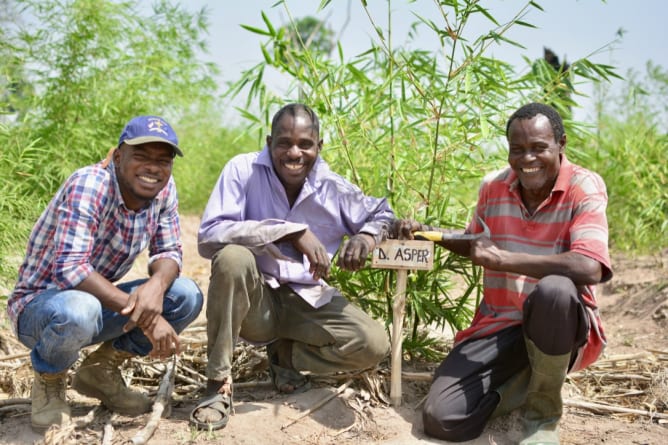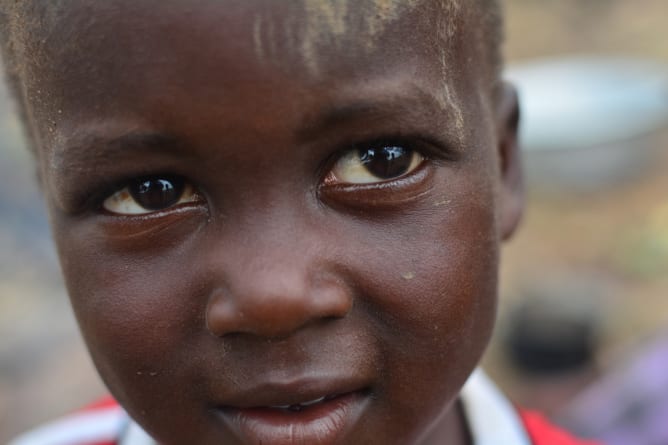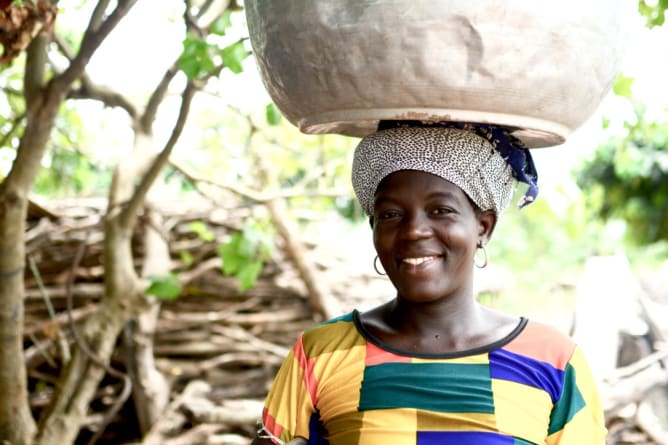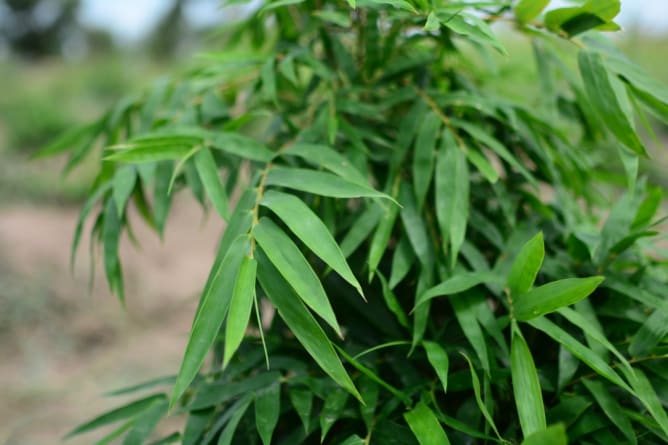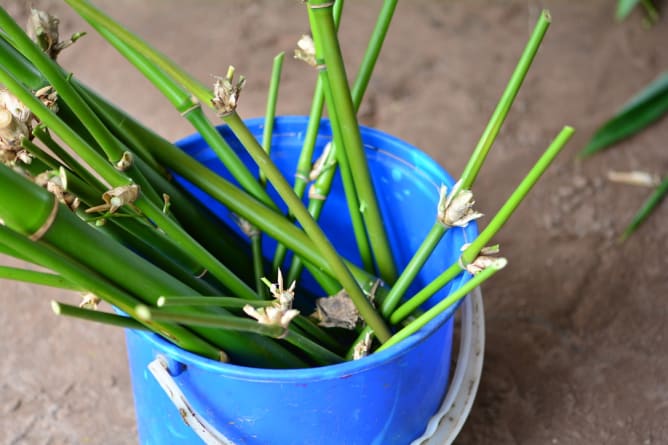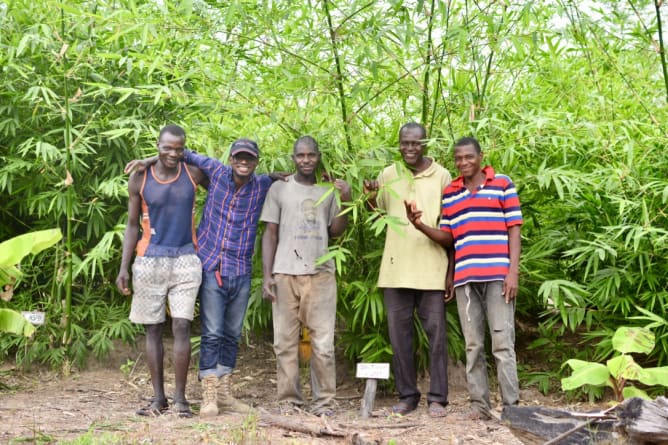Bambus Agroforstwirtschaft
Bambus Agroforestry (Bambus Land-/Forstwirtschaft)
BIDG - BAMBOO FOR INTEGRATED DEVELOPMENT IN GHANA wurde 2017 in Ghana als gemeinnützige NGO ins Leben gerufen. Sie setzt sich mit Herzblut für die Einführung einer nachhaltigen Bambus-Agrikultur in Ghana ein. Unser Ziel ist es, durch den Anbau von Bambus die Lebensumstände der ghanaischen Kleinbauern merklich zu verbessern und darüber hinaus eine ökologische, resiliente Anbaukultur in Ghana zu fördern.
Durch ihre bereits bestehende Zusammenarbeit mit den lokalen Gemeinschaften von Kleinbauern will BIDG ein alternatives Agrikulturmodell in der Region anbieten, das skalierbar ist und das sich dank der günstigen Auswirkungen der Bambus-Landwirtschaft günstig auf die Umwelt auswirkt und die Nachhaltigkeit im Land fördert.
Der Status Quo: Die in den Sekyere Afram Plains lebenden Siedler sind aus dem Norden Ghanas zugewandert. Sie gehören nicht zum Stamm der Ashanti. Ihre Anwesenheit ist nur geduldet, sie besitzen keine Rechte an Grund und Boden. Leider ist die von den Siedlern betriebene Landwirtschaft in keiner Weise nachhaltig. Mit Hilfe von Brandrodungen wird Waldfläche in Agrarland umgewandelt und hauptsächlich mit Mais in Monokultur bestellt. Die Artenvielfalt geht sukzessive zurück. Fruchtfolgesysteme sind zwar bekannt, werden aber nicht umgesetzt und die Bodenqualität verschlechtert sich rapide.
Die Bedrohung durch Klimaveränderung und Schädlinge nimmt zu. Als Folge davon verringern sich die Erträge zusehends, was mit immer grösserem Einsatz von Pestiziden zu bekämpfen versucht wird. Es wiederholt sich genau das, was ursprünglich zur Abwanderung der Siedler aus dem Norden Ghanas geführt hat. Um diesen «Teufelskreis» zu durchbrechen, braucht es eine enge Zusammenarbeit mit den Kleinbauern vor Ort, in deren Mittelpunkt der Wissenstransfer und die Schulung der Gemeinden stehen, aber auch ein verbindliches Regelwerk, das eine erfolgreiche Ernte garantiert.
Warum Bambus?
Bambus ist eine schnell wachsende Pflanze, die auch auf schlechten und ausgelaugten, degradierten Böden gedeiht. Bambus wandelt CO2 sehr effizient in Pflanzengewebe um und ist in vielerlei Hinsicht ein Verbündeter im Kampf gegen die negativen Auswirkungen der Klimaerwärmung. Das schnelle Wachstum erlaubt die Beschattung der Böden und die abfallenden Blätter tragen aktiv zur Humusbildung bei. Das Wurzelsystem ist ein wichtiger Wasserspeicher für den umliegenden Bodenbereich. Kurz gesagt: Degradierte Böden kommen mit Hilfe von Bambus wieder in Gang.
Wir brauchen deine Unterstützung...
Zunächst müssen die Siedler für die ökologischen Probleme sensibilisiert werden und durch das Aufzeigen einer nachhaltigen Alternative von der Notwendigkeit überzeugt werden, ihre Landwirtschaft Schritt für Schritt umzustellen. Dafür braucht es physisch einen Ort, der zum Wissenstransfer und zur Schulung der lokalen Bevölkerung genutzt wird und den Kleinbauern als Anlaufstelle dient. ______________________
BIDG hat in der Ashanti Region Ghanas 10 Hektaren Land erworben und ist dabei eine Pflanzenschule für Bambussetzlinge und andere Nutzpflanzen zu errichten. Für die Bewässerung der Pflanzenschule wurde ein Grundwasserbrunnen gebohrt, der bereits zur Verbesserung der lokalen Infrastruktur beiträgt.
Für den Ausbau der Pflanzenschule und das Errichten einer Schulungsinfrastruktur benötigen wir zusätzliche finanzelle Mittel im Wert von CHF 30’000, die unser jährliches Budget derzeit übersteigen:
Konkret benötigen wir das Geld für folgende Anschaffungen:
CHF 4’000 für zusätzliche Arbeitsgeräte, die für die Beackerung der Pflanzenschule eingesetzt werden: Balkenmäher, Mulcher, kleinere Anbaugeräte und Werkzeuge.
CHF 15’000 für die Errichtung und Überdachung des Schulungsgebäudes unmittelbar neben der Pflanzenschule: Sicherstellung eines Schattenwurfes für Arbeitsflächen, Schulungsraum, Bau einer Kompost-Toilette
CHF 11’000 für die Sicherstellung der Bewässerung: Vorrichtung für das Sammeln von Regenwasser und allfälliges Dämmen von Bächen in Teichen sowie für die Realisation eines weiteren Bohrlochs.
Unser Ziel:
Bis Ende 2018 sollen rund 15’000 Bambussetzlinge zum Auspflanzen bereit stehen. Dadurch stellt BIDG den Kleinbauern eine konkrete, auf das lokale Klima und die vorhandene Topographie und Bodenqualität abgestimmte Form des integrierten Bambusanbaus zur Verfügung. Ein solches Modell soll Antworten auf folgende Fragen liefern:
- Da es sehr unterschiedliche Bambussorten gibt, gilt es diejenigen Arten auszuwählen, die für die lokalen Bedingungen und die Anforderungen des Projektes geeignet sind.
- Welche Gewächse eignen sich im Sinne der resilienten und nachhaltigen Bamboo Agro-Forestry für einen Anbau zwischen den Bambushorsten?
- Wie kann die Ernte sinnvoll verwendet werden? Wieviel Maisanbau bleibt (zunächst)? BIDG hat in den vergangenen zwei Jahren die Bezahlung der Saläre der Angestellten sicherstellen können und ist für sehr viele weitere Kosten aufgekommen. Nun ist der Punkt erreicht, an dem wir auf finanzielle Unterstützung angewiesen sind, um dieses wichtige Projekt voranzutreiben und eine nachhaltige Landwirtschaftskultur für die Zukunft sicherzustellen.
Mit Deiner Spende hilfst Du die Lebensbedingungen der ghanaischen Kleinbauer zu verbessern und leistest einen Beitrag dazu, die Abrodung des Regenwaldes zu verhindern und der Klimaerwärmung mit einer konkreten Handlung entgegenzuwirken.
Für Deinen Beitrag bedanken wir uns herzlich, ebenso wie für Dein Bewusstsein, dass es im Hinblick auf die Klimaerwärmung Handlungsbedarf braucht.



